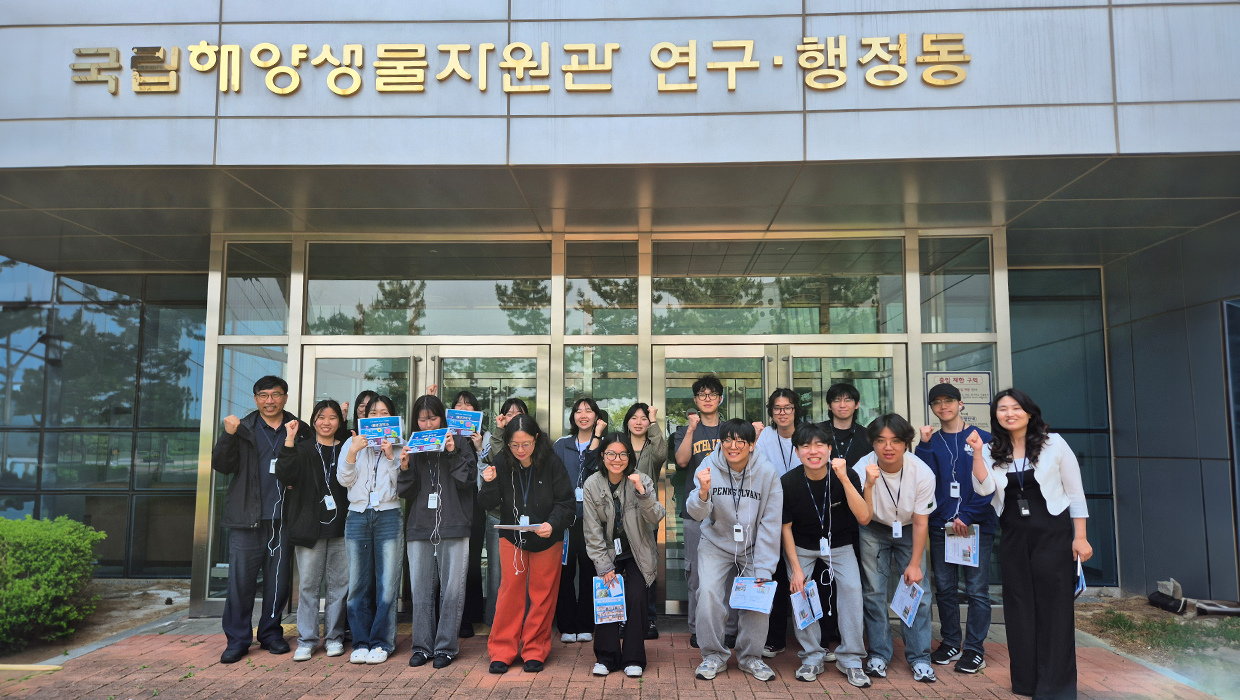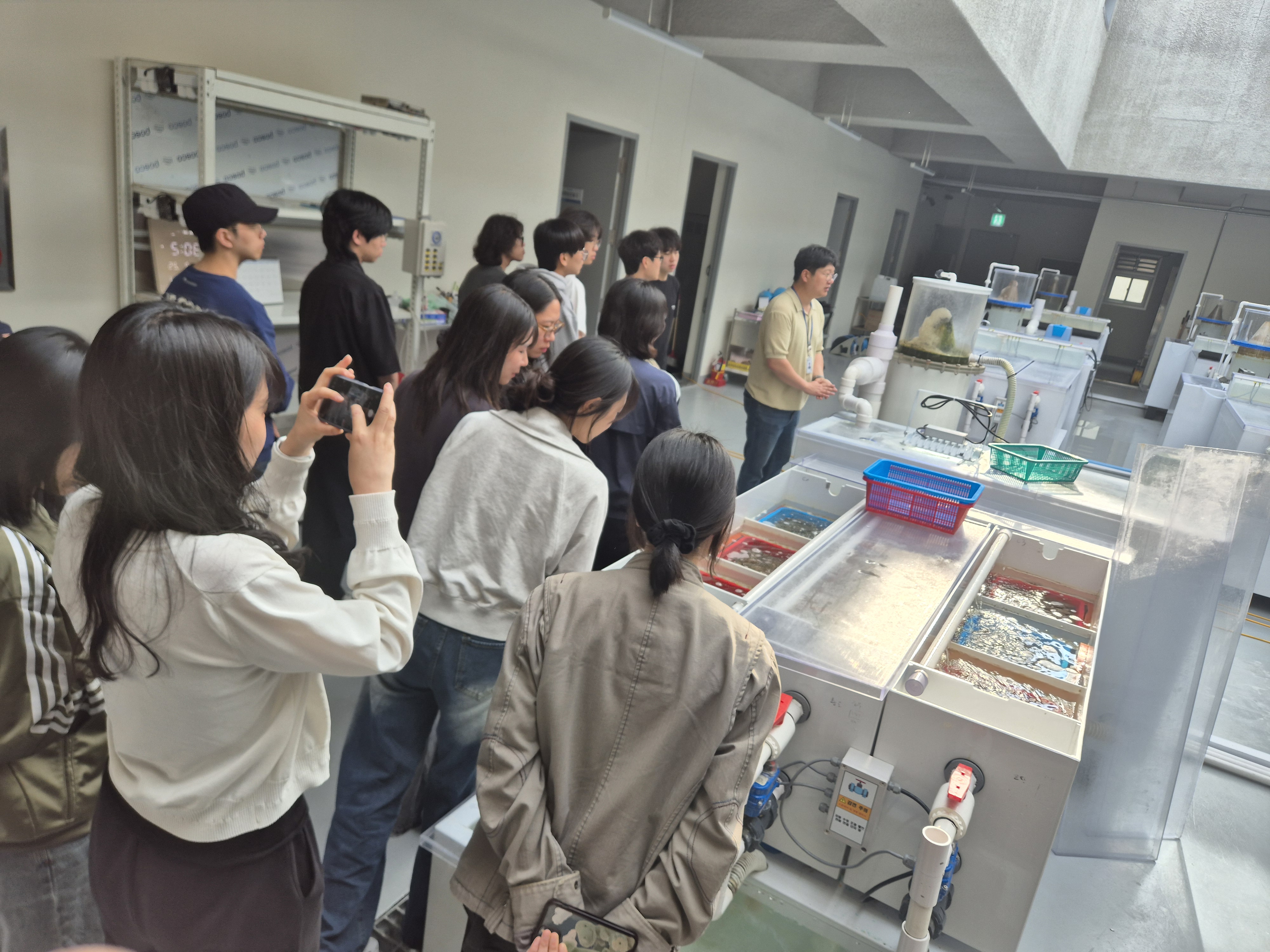Department of Marine Science at Incheon National University Provides Practical Training on Marine Biological Resources Through Visits to Aquaculture Research Institutions
- 글번호
- 407008
- 작성일
- 2025-05-29
- 수정일
- 2025-05-29
- 작성자
- 홍보팀 (032-835-9490)
- 조회수
- 258
As part of its foundational science curriculum, the Department of Marine Science at Incheon National University (Chair: Professor Jang-Gyun Kim) organized an educational field trip for students enrolled in the course “Aquaculture and the Environment.” The program took place over two days, May 13 and 14, and involved visits to key aquaculture-related institutions across the country.
The purpose of the field trip was to enhance students’ practical competencies by combining theoretical instruction with on-site experiential learning about aquaculture methods for marine biological resources.
The students visited a total of three institutions:
-
National Marine Biodiversity Institute of Korea (Seocheon)
-
Tidal Flat Research Center, National Institute of Fisheries Science (Gunsan)
-
Incheon Fisheries Resources Research Institute
At each site, students engaged in specialized research and educational programs focused on topics such as seed production, conservation, disease management, and aquatic environment control for various aquaculture species. The experience provided a deep and practical understanding of real-world aquaculture practices and technologies.

국립해양생물자원관 방문
Seocheon National Marine Biodiversity Institute – “Marine Scientist RoadLab” Program for University Students
The National Marine Biodiversity Institute of Korea (MABIK) in Seocheon houses the largest collection of marine biological resources in the country and features advanced specimen exhibition facilities along with an independent research complex. For this visit, the institute adapted its existing “Marine Scientist RoadLab” program to suit the academic level of university students.
During the 90-minute session, students participated in various hands-on activities, including observing marine organisms using electron microscopes, touring the specimen storage facility, and creating biological specimens using macroalgae. They also explored the exhibition halls, where they had the opportunity to closely examine specimens from a wide range of taxonomic groups, including macroalgae, zooplankton, invertebrates, and fish.

Gunsan Tidal Flat Research Center – In-Depth Study of Tidal Flat Ecology and Aquaculture Techniques
Located in Gunsan, the Tidal Flat Research Center under the National Institute of Fisheries Science focuses on key research related to the cultivation of Manila clams, which are primarily farmed in the tidal flats along Korea’s west coast. The center's main activities include seed management, disease control, and ecosystem monitoring.
During the visit, students toured sediment analysis equipment and biological and chemical research laboratories, while learning about the center’s major research topics and outcomes through multimedia presentations. They also observed field survey equipment, including amphibious vehicles, and visited actual aquaculture facilities to gain hands-on exposure to field-based technologies.

Incheon Fisheries Resources Research Institute – Hands-on Training in Regionally Specialized Aquaculture Species
The Incheon Fisheries Resources Research Institute is dedicated to the restoration of fisheries resources and the enhancement of aquaculture productivity in Incheon. During the recent site visit, students observed various aquaculture species currently being cultivated at the institute, including Sebastes schlegelii (Korean rockfish), common octopus, spotted sea bass, and whiteleg shrimp. They also learned techniques for cultivating phytoplankton and Artemia, which are used as feed for these species.
In particular, students had the opportunity to tour the macroalgae culture tanks used in joint research projects between the institute and Incheon National University. This experience allowed them to directly engage with real-world research processes that combine academic theory and practical application.
The Department of Marine Science at Incheon National University stated,
“This visit provided students with valuable field experience in the scientific management and aquaculture techniques of marine biological resources. We plan to continue expanding practical learning opportunities that bridge academia and industry.”

